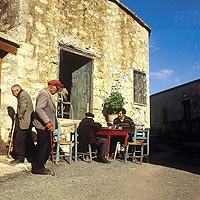
North Cyprus customs and traditions include Cypriot hospitality, coffee houses, hamams, blue beads and more.
 |
the north cyprus travel guide |
 |
|
Customs & Traditions
North Cyprus Hospitality: the best in the world?Wherever you go in North Cyprus, you can be sure of a warm welcome. This is not some "tourist charm offensive", however, it’s very much part of the North Cyprus customs and traditions. North Cyprus: an English corner of the Mediterranean?The legacy of British rule in Cyprus is still evident today, with legal systems based on British models and, of course, the fact that in North Cyprus you drive on the left hand side of the road. It’s also evident in the friendly welcome given to English-speaking visitors in North Cyprus. Start talking to a Turkish Cypriot and you’ll soon find that most speak excellent English, and those that don’t can still be understood by smiles and much hand-waving! The North Cyprus "misafir", an honoured guestSooner or later, you’ll probably find that your new Turkish Cypriot friend will invite you in to their house. If you are a guest, or "misafir", you will be offered a seemingly endless stream of drinks, fruit and tasty tidbits, and it’s bad manners to refuse such generous hospitality. Even a humble cup of Turkish coffee should be savoured, as it’s considered rude to leave before the cup is cold! North Cyprus coffee houses and cafésEvery village in North Cyprus probably has a coffee house or café somewhere, and all you need to do is listen to find it! The chatter and laughter of men will lead you to two opponents playing "tavli", or Cyprus backgammon, mixes with the gentle banter of those watching the game. If you show a healthy interest, you might even be invited to join in! Back in the North Cyprus coffee shop, you might spot the older generation smoking water pipes, although this tradition is slowly dying out. Cafés in North Cyprus will warmly welcome female visitors, the waiters friendly and eager to please, whilst the traditional Northern Cyprus coffee shop remains a male domain. Northern Cyprus Hamam, or Turkish BathsThe Romans may have first built bath houses on Cyprus, but it was the Ottoman Empire that ensured every citizen had access to a public bath complex, or "hamam". Only two of these original North Cyprus bath complexes still survive, both in Nicosia, of which the most famous is the Grand Turkish Baths. These impressive North Cyprus Turkish baths are built on the site of an old church, with walls dating from the Lusignan period. The baths are still open today, and are unusual in that the whole complex is 3 metres below street level. Some major hotels in North Cyprus, such as the Acapulco Resort, feature their own modern Turkish Bath complexes. Traditional Turkish bath houses in Northern CyprusTraditional Turkish bath houses have separate bathing facilities for men and women, or different times for bathing. You leave your clothes in the cubicle provided, and wander into the baths wrapped in your towel. Head for the ‘göbek tashi’, a large heated stone usually in the middle of the room, where you will be rubbed down by a masseur. After the heat of this first room, you move into another room to cool down again. North Cyprus Folk Dancing and CraftsIn the last decade or so, there has been a great resurgence of interest in North Cyprus folk traditions, including folk dancing and traditional handicrafts. After all, Leonardo da Vinci bought the finest lace from Cyprus for Milan Cathedral! Why do Turkish Cypriot shopkeepers give me blue beads?If you are given a blue bead pendant, it’s to ward off the "evil eye". This is an example of how old pagan-originated superstitions have lived on despite thousands of years of religion and scientific progress! |
|
North Cyprus quick: holidays | flights | hotels | property | kyrenia | famagusta | photos | map | weather | history | news
All text is copyrighted by Cyprus44. Photographs are copyrighted by their respective photographers.
For more information read our copyright policy, privacy policy and disclaimer.
This web page is served on 18 September 2025 at 3:57:19 AM.
![]()
Cyprus44 in other languages: Nordzypern | Chypre Nord | Severní Kypr | Северный Кипр
partner sites: goNorthCyprus Travel | Pacific Rent-A-Car | Amy Holiday Villas | other partner sites







